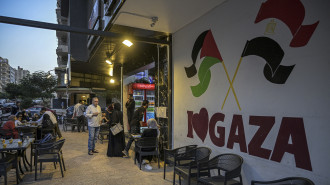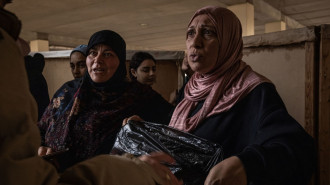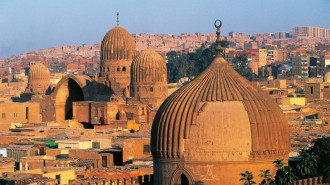![Palestinian poets and translators read their work at a preview event for the Palestine Writes Literature Festival. [Brooke Anderson/The New Arab]](/sites/default/files/styles/image_360x240/public/2023-09/IMG_5724.jpg?h=71976bb4&itok=tHVGV6HY)
An evening of poetry sets stage for Palestinian festival
![Palestinian poets and translators read their work at a preview event for the Palestine Writes Literature Festival. [Brooke Anderson/The New Arab]](/sites/default/files/styles/image_360x240/public/2023-09/IMG_5724.jpg?h=71976bb4&itok=tHVGV6HY)
An evening of poetry and translations preluded the official opening of the Palestine Writes Literature Festival in Philadelphia.
On Thursday, in an event called The World as Palestine, dozens of attendees packed into Kelly Art House, a small building on the University of Pennsylvania campus, to hear the poems and translations of Olivia Elias and Ahmad Almallah.
"It's fitting that we gather here today, where poetry lives in Philadelphia," said Huda Fakhereddine, Almallah's translator and the evening's moderator, as she introduced the evening's speakers and referred to Kelly House as a safe space.
Earlier in the day, a man had vandalised the Jewish student building Hillel, which the Palestine Writes oarganisers immediately condemned, calling for a full investigation, before they continued with the evening's poetry.
The two poets, though different in styles and perspectives, discussed common themes of exile and connectedness to family and land.
The first poet to speak was Elias, who read several of her works in French, followed by English readings by her translator Sarah Riggs.
"I was born in this eruptive time, when my country's name was changed. I was born in this seismic time that even engulfed the name of my father, and my father's father. I grew up on a volcano. Eruptions of blood still light up the savage night," read Briggs, following the original French poem.
This was followed by the poems by Almallah in English, then read by his Arabic translator and wife, Fakereddine.
The first poem, from his book Bitter English, was called Map, in which he described his feelings of returning to his homeland while flying over in a plane. Having been raised in Bethlehem, Arabic is his native language.
Nevertheless, after being away for long periods, he feels the frustration of disconnection, which he expresses in poetry as disconnection through language.
"From above, we pass the places I couldn't visit on this return," he reads, in part. "We pass over more white clouds, over Jerusalem now. I turn the screen to languages. Are these Arabic words I see. Why? I can't read them anymore. Maybe, maybe I need to be there on level with the land in order to read the land."
The evening ended with a bit of comic relief, with Almallah and Fakhereddine's 11-year-old daughter asking, during the Q&A session why Almallah was interested in tables and chairs (one of his poetry subject matters) and why he didn't write poems about her.
The four poetry collections being presented were Chaos, Crossing and Your Name Palestine by Elias and Bitter English and Border Wisdom by Almallah, all available for purchase at the event.
![Palestinians mourned the victims of an Israeli strike on Deir al-Balah [Getty]](/sites/default/files/styles/image_684x385/public/2024-11/GettyImages-2182362043.jpg?h=199d8c1f&itok=xSHZFbmc)


![The law could be enforced against teachers without prior notice [Getty]](/sites/default/files/styles/image_684x385/public/2178740715.jpeg?h=a5f2f23a&itok=hnqrCS4x)
 Follow the Middle East's top stories in English at The New Arab on Google News
Follow the Middle East's top stories in English at The New Arab on Google News


